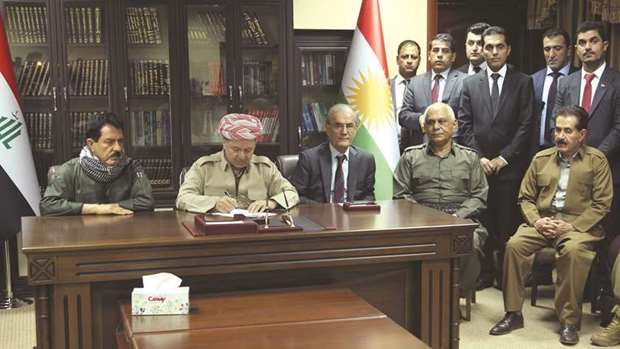Iraq’s Kurdish leader Massoud Barzani vowed yesterday to press ahead with a referendum on Kurdish independence on Sept 25 despite a vote by Iraq’s parliament to reject the move.
Earlier the parliament in Baghdad authorised the prime minister to “take all measures” to preserve Iraq’s unity.
Kurdish lawmakers walked out of the session before the vote and issued statements rejecting the decision.
Western powers fear a plebiscite in Iraq’s semi-autonomous Kurdish region — including the oil-rich city of Kirkuk — could ignite conflict with the central government in Baghdad and divert attention from the war against Islamic State militants.
Iraq’s neighbours — Turkey, Iran and Syria — also oppose the referendum, fearing it could fan separatism.
“The referendum will be held on time...Dialogue with Baghdad will resume after the referendum,” Barzani, president of the Kurdistan Regional Government (KRG), said in a statement on his ruling party’s official website after the vote.
Barzani told a gathering in Kirkuk that the referendum was “a natural right”, according to a tweet from his aide Hemin Hawrami.
Barzani also said Kirkuk should have a “special status” in a new, independent Kurdistan.
Iraqi lawmakers worry that the referendum will consolidate Kurdish control over several areas claimed by both the central government in Baghdad and the autonomous KRG in northern Iraq.
“This referendum lacks a constitutional basis and thus it is considered unconstitutional,” the parliamentary resolution said, without specifying what measures the central government should take to stop Kurdistan from breaking away.
Mohamed al-Karbouli, a lawmaker, said: “Kurdish lawmakers walked out of (Tuesday’s) session but the decision to reject the referendum was passed by a majority.”
A senior Kurdish official dismissed the vote as non-binding though an Iraqi lawmaker said it would be published in the official gazette after approval from the Iraqi presidency. The KRG has said it is up to local councils of disputed regions in northern Iraq to decide whether to join the vote.
Kirkuk, an ethnically mixed city, voted last month to participate in the referendum, a move that stoked tensions.
Kurdish peshmerga forces took control of the Kirkuk area and other areas claimed by both Baghdad and the Kurds after Islamic State militants overran about a third of Iraq in 2014 and Baghdad’s local forces disintegrated.
At a news conference yesterday, Iraqi Prime Minister Haider al-Abadi said the Kurds were continuing to “illegally export” Kirkuk’s oil, and he called for urgent talks.
“I call upon the Kurdish leadership to come to Baghdad and conclude a dialogue,” Abadi said.
A Kurdish delegation met officials in Baghdad for a first round of talks in August concerning the referendum.
An Iraqi delegation was expected to visit the Kurdish capital of Erbil in early September for a second round of talks, but the visit has yet to happen with less than two weeks before the vote.
Meanwhile, on the eve of an independence referendum in Iraq’s Kurdistan region, one man is campaigning against a “Yes” vote which he fears could stoke tension in the Middle East.
With the 5mn Kurds in Iraq who are eligible to vote united by dreams of statehood, the outcome of the Sept 25 referendum in the autonomous region in northern Iraq is in no doubt.
But with Baghdad making clear it opposes independence for a region that has abundant oil reserves, some voters fear now is not the time to start moves to break away from Iraq — and rich businessman Shaswar Abdulwahid Qadir has taken up their cause.
Despite being branded a traitor by political enemies, he has taken on the establishment by launching a “No for now” campaign to explain the economic and political risks of a “Yes” vote.
“A ‘No’ vote is better for our people, better for Kurdistan’s future,” the 39-year-old businessman told Reuters after a rally on Saturday in a soccer stadium in Sulaimaniya, Iraqi Kurdistan’s second largest city.

Iraq’s Kurdistan region president Massoud Barzani (second left) attends a meeting with Kirkuk provincial Governor Najim al-Din Karim (third left), first Deputy for the Secretary General of the Patriotic Union of Kurdistan (PUK) party Kosrat Rasoul Ali (left), Peshmerga commander Jaafar Sheikh Mustafa (second right), Salah Dalo, leading member of the Kurdistan Democratic Party (KDP), and other Peshmerga and Kurdish party leaders in the northern city of Kirkuk yesterday.
